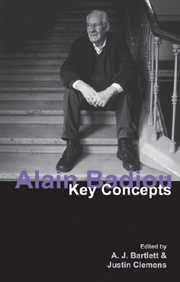Book contents
- Frontmatter
- Contents
- Contributors
- Acknowledgements
- Abbreviations
- Miscellaneous Frontmatter
- Introduction: Badiou's form
- 1 Biography and early works
- PART I THE FOUNDATIONS OF BADIOU'S THOUGHT
- PART II BADIOU'S KEY CONCEPTS OR “CONDITIONS”
- PART III BADIOU'S ENGAGEMENT WITH KEY PHILOSOPHERS
- 10 Plato
- 11 Spinoza
- 12 Kant
- 13 Hegel
- 14 Heidegger
- 15 Lacan
- 16 Deleuze
- 17 New directions
- Afterword: Badiou's futures
- Bibliography
- Index
16 - Deleuze
from PART III - BADIOU'S ENGAGEMENT WITH KEY PHILOSOPHERS
- Frontmatter
- Contents
- Contributors
- Acknowledgements
- Abbreviations
- Miscellaneous Frontmatter
- Introduction: Badiou's form
- 1 Biography and early works
- PART I THE FOUNDATIONS OF BADIOU'S THOUGHT
- PART II BADIOU'S KEY CONCEPTS OR “CONDITIONS”
- PART III BADIOU'S ENGAGEMENT WITH KEY PHILOSOPHERS
- 10 Plato
- 11 Spinoza
- 12 Kant
- 13 Hegel
- 14 Heidegger
- 15 Lacan
- 16 Deleuze
- 17 New directions
- Afterword: Badiou's futures
- Bibliography
- Index
Summary
The continuation of philosophy is important for both Badiou and Deleuze. Unlike many of their generation, neither accepted that the end of philosophy was upon us. Indeed, as Badiou admits, both are classical in their approach, taking the perennial problems of metaphysics, such as the One and the Many, or the finite and the infinite, to be fundamental for their own projects. Further evidence of their classicism lies in Badiou and Deleuze equally disliking dialogue (or analytic “debate”) as a model of philosophical procedure: theirs is the aristocratic style of disputatio (D 45). In addition, both of their enterprises are animated by modern thinkers – Spinoza for Deleuze and Descartes for Badiou. They are equally unique, for their time, in being avowedly pre-Kantian, albeit with a post-Kantian awareness of all the difficulties that follow from such a position.
But here is where some gaps between Deleuze and Badiou appear. Where Badiou still has faith in the project of modernity, and indeed in Cartesian rationalism, Deleuze's invocation of Spinoza (or Leibniz) is made only to conjoin them with a certain poststructuralist (rather than post-modernist) agenda that would be the ruin of various rationalist dogmas. For Deleuze, Descartes is a philosophical adversary, whose conceptual legacy must be overcome: the dualisms of mind and body, civilization and insanity, human and animal, representation and world, are all to be abandoned as enemies of any true philosophy of immanence (such as Spinoza's or Deleuze's).
- Type
- Chapter
- Information
- Alain BadiouKey Concepts, pp. 168 - 175Publisher: Acumen PublishingPrint publication year: 2010
- 1
- Cited by

